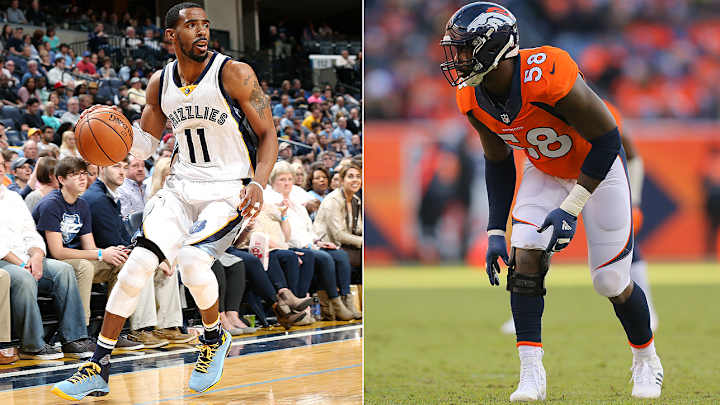Why Comparing Contracts Across Sports Doesn’t Work

It’s an annual rite of the slow sports months that are June and July: Some NBA player who’s never made an all-star game signs a colossal contract and people start wondering aloud why anyone would play football.
The 2016 version: Mike Conley, the point guard who signed a five-year, $153 million contract with the Grizzlies this month after averaging 15.3 points and 6.1 assists per game in 2015-16, his ninth NBA season. Contrast that with Von Miller’s current contract stalemate with the Denver Broncos in which he has three options: Accept a 1-year franchise tag for a bit more than $14 million, take the offer on the table (reportedly six years, $114 million, per ESPN) or sit out a season.
Predictably, the people who loathe such comparisons are the same gentlemen who negotiated the current collective bargaining agreement with the NFL in 2011, ending a lockout with a 10-year pact. NFL Players Association assistant executive director of external affairs George Atallah (a required follow for all you Tweeters) describes the comparison as apples to oranges.
“It frustrates me that people just don’t do math,” Atallah says. “One business has 53 employees. One business has 15. One business has an average career length of less than four years, and the other business has an average much longer than that.”
But if that’s the case, shouldn’t NFL players who are assuming a greater injury risk get a bigger piece of the pie?

“I suppose you could make an argument that share in one business should be greater than another,” Atallah counters, “but you negotiate a deal based on the one that came before, and we’ve always been around 50%.”
It’s true the NFL owners were completely unwilling to make major concessions back in 2011, even when facing the prospect of a delayed season, and the black eye that would come with no games on the 10th anniversary of 9/11. The union floated the idea of losing the franchise tag, but the concessions they would have had to make in return were too great.
The franchise tag is valuable to teams because it creates a natural ceiling for contracts for star players. The very threat of the tag forces players to negotiate long-term deals from a position of weakness, which keeps big-time contract extensions relatively modest. In this way, the tag is a more extreme version of the NBA’s max contracts, which caps deals at a percentage of the cap based on how many years a player has been in the league.
In the end, the NFL had little reason to believe more than 2,000 players, many of whom ignored the NFLPA’s 2010 calls to save money and continued to live beyond their means, would actually commit to missed paychecks when the time came.
So the union decided to strike a deal for the middle and lower classes. Multiple policies protecting against injury were enacted; rookie wages were cut dramatically so veteran free agents in the second, third and fourth tiers of performance could land reasonable second contracts. Sure, the Von Millers of the world continue to get the short end, but guys like Malik Jackson—who just jumped from the Broncos to the Jags for six years, $90 million—now thrive.
“Our system is designed to protect players as much as we can against a short career,” Atallah says. “So things like a higher minimum salary, injury protection, 89% minimum cap spending, post-career benefits that extend into forever. Our system is designed specifically towards the type of employee we have who is at risk of injury.
“That’s the best argument against comparing us and any sport; we just have a unique employee base.”
So if you must needle the NFLPA and its players for signing on the dotted line in 2011, just know they aren’t hearing it.
Now, for your email...
• MONDAY MORNING QB, GUEST EDITION: Jake Plummer’s plan to alleviate pain for players
* * *

NO HOPE FOR CBD CHANGE
Regarding Jake Plummer's column, I fear that CBD is a topic that will engender the same amount of thoughtful, rational discussion as climate change and Brexit—virtually none. There are a lot of long held and emotional positions on both sides, and I expect they will not die easily. In addition to the medical researchers, expect grandstanding politicians, religious groups, religious grandstanding politicians, businesses, educators and teachers unions to jump in. I wouldn’t be surprised to see it become yet another un-crossable chasm for the Democrats and Republicans to take up. Hope for better, but not optimistic.
—Greg, Calgary
We asked Jake to respond to this question. Here’s what he said:
“Thank you for your response Greg. I understand your concerns about the political and emotional implications of this discussion but I have hope that the people suffering from incurable illnesses and relentless pain will be able to overlook their long-held beliefs. Support for cannabis, and specifically CBD, from politicians on both sides of the aisle has been encouraging. We have learned and witnessed through 20 states passing cannabis legislation in the past two years that this is actually not a political issue at all. Every human has a right to not want to suffer; therefore this is a human rights issue. We can and will overcome this.”
THE REAL SNAKE
How dare this less than mediocre quarterback call himself The Snake? Sorry Jake Plummer, but Ken Stabler was the one and only! Secondly, maybe Jake should step away from the bong and check the history books before he calls out Peyton Manning and Tom Brady for playing in an era soft of quarterback hits. Plummer drafted in 97. Manning 99. Brady 2000. All three played in the same era; one had less talent and heart.
—Rob C., Vancouver Island, B.C.
Plummer embraced the Snake nickname as a tribute to Stabler, his favorite player growing up. As the story goes, Jake’s older brother saw him reading Stabler’s autobiography while Jake was in grade school and started calling him Jake the Snake. Think of Plummer as a fellow devotee, not a usurper. As for your “less talent and heart” comment, I shouldn’t even dignify that with a response, but here goes. Jake Plummer played the entire 2003 season with a broken left foot and a damaged throwing shoulder AND led the Broncos to the playoffs that year. Is Jake Plummer less talented than Peyton Manning? Certainly, but leave the man’s heart out of this.
QUARTERBACK ABUSE
I enjoyed Plummer’s column but found his comments about Peyton Manning and Tom Brady off-base: “They don’t take the same abuse quarterbacks did when I played.” Plummer’s first NFL game was in 1997. Peyton’s 1998. Brady’s 2001. The league operated within the same rules for quarterbacks during that time. You all played in the same era. Stating that you took more abuse is not correct.
—Christopher
I would argue the biggest change in the past two decades has been the ability to survive as a smart, mobile quarterback. Who knows what kind of player Plummer would have been if he had all the protections Russell Wilson enjoys when he scrambles out of the pocket and slides to the ground before hits. Manning and Brady were pocket passers with quick releases, which saved them from punishment early in their careers. As they grew older, the rules began shifting towards preserving their bodies—no hitting above the neck, below the knees. Quarterbacks were beginning to be described with a new and foreign word in football: Defenseless. Plummer, having played his career in the style of a Russell Wilson but without modern protections, didn’t last long enough to enjoy this era.
TWO READERS SAY THANKS TO JAKE
This is the most articulate and informative column I have read on MMQB. I now have a better appreciation and understanding of the widespread life of pain of former and current NFL players and am more knowledgeable on the evolution of the use of cannabis and its benefits. Mr. Plummer’s appreciation and memories of Pat Tillman, his opinions on the quality players of his time and today and his observations on some of the rules of the game that could be altered were right on the money. And somewhere along the line, in elementary, junior high, high school or college, he had a teacher(s) who knew how to reach students and emphasize the fundamentals of putting clear and concise thoughts on paper. Thanks, Mr. Plummer.
— P. Henning
Jake F---ing Plummer knows what he’s F---ing talking about. Good luck though on trying to put any stop to fantasy football. That's a billion dollar industry in a capitalistic country that has zero intention in giving up said billions. Great article, though.
— Matt V.
Jake was very grateful for the opportunity and we were thrilled to have his insight on the site.
MMQB AS A FULL-PAGE AD
I enjoyed Snake's Takes for sure and understand the issue Plummer focused on is an important one, but doesn't his bias (as a paid spokesman for the company) warrant some kind of differing perspective? The stuff sounds like it could cure anything! Get me some! But consider the source. Does he own any shares in that company? Is there any differing research? Love the site and love the guest narratives but was troubled by this one and somewhat concerned high schoolers and college players will overly rely on it.
— Adrian, Texas
We weren’t trying to hide anything. We told Jake to include a line about his stake in the issue, and he had no problem with that. For me, what it comes down to is this: I spoke with Jake at length and edited his various drafts and I don’t believe Jake’s stake in a CBD manufacturer weighs more heavily on his opinions and insights than his actual experience playing pro football and dealing with pain.
Much has been written about CBD and Jake, and we were satisfied that we were not introducing a topic into the public sphere with one man’s opinion. I would encourage people considering the use of CBD as a pain reliever to take Jake’s word as just that, one man’s opinion. That said, this will not be the last time The MMQB writes about CBD.
ON SHAUN SUISHAM’S RETIREMENT
I know players are forced to retire quite often due to injury and they usually just get an obscure footnote on the transactions wire, but I wonder if you could make an exception for Shaun Suisham because of the circumstances of his career. Here's a guy who came out of Bowling Green as free agent and had the looks of simply being another camp leg, yet turned his career around in one of the hardest stadiums in the NFL in which to kick, Heinz Field in winter. It's a testament that you can improve your craft and be one of the better players at your position through perseverance. He was not in Justin Tucker/Adam Vinatieri/Dan Bailey territory, but he became a far better kicker than anyone expected. The other thing is that his career ended trying to make a tackle on a lousy high school field for an exhibition game. So how about a shoutout to Suisham, my fellow Canuck?
—Barry M., Salmon Arm, B.C.
You’re right in thinking Suisham deserves some love from The MMQB. Your email got me thinking about the best Canadians to ever play the game, so I came up with this Top 10. Mark Rypien and Nate Burleson, though born in Canada, did not spend any formative football years north of the border, so they were not included. (If they had, they would probably be Nos. 1 and 3 on this list.)
1. O.J. Atogwe, S. Poor man’s Sean Taylor. Hard-hitting safety lasted eight seasons and retired with 25 picks and 374 tackles, with 13 picks in a two-season stretch (2007-08, St. Louis). Attended high school in Windsor before college at Stanford.
2. Tom Nutten, G. Quebec-raised. Steady blocking presence at left guard for the Greatest Show on Turf in St. Louis with 69 career starts. Has a Super Bowl ring.
3. Jerome Pathon, WR.Had260 catches and 3,350 yards in eight seasons with the Colts, Saints and Falcons. Went to high school in North Vancouver and had a cup of coffee at Acadia University in Nova Scotia before transferring to Washington.
4. Rueben Mayes, RB. Third-round pick from Saskatchewan rushed for 1,353 yards as a Saints rookie in ’86. Two-time Pro Bowler finished with 3,484 yards in seven seasons.
5. Israel Idonije, DE. Rotational depth for most of his career, but logged 20.5 sacks during his final three seasons in Chicago. Plus, 155 games played is nothing to sneeze at. Attended Neelin High in Brandon. Bonus points for attending a Canadian college (Manitoba).
6. Shuan Suisham, K. The kid from Wallaceburg, Ontario, went from being cut by the Steelers as an undrafted rookie free agent to joining the club five years and five teams later and making 87.9% of his kicks in five seasons with the team.
7. Tim Biakabutuka, RB. Played high school ball and a year of post-graduate football in Quebec before breaking Michigan’s single-season rushing record. Didn’t quite live up to the first-round billing with just over 2,500 yards rushing in six seasons, all with the Panthers. Fun fact: Tim now owns several Bojangles stores in Georgia.
8. Orlando Franklin, G. Jamaican-born, Toronto-raised Chargers guard was converted from tackle three years into his career after being drafted by Denver in the second round out of Miami in 2011. With 73 games started in just five seasons, he has potential to vault up this list.
9. Jon Ryan, P. Born and raised in Regina, Ryan has started 159 games with 44.8 yards per punt. Pro: Threw a damn touchdown pass in the NFC Championship a few years ago. Con: Is not a person.
10. Rob Meier, DL. Vancouver-born 300-pounder started 49 games in nine seasons for the turn-of-the-century Jags and finished his career with 184 tackles and 21.5 sacks.
Just missed the cut: Austin Collie, Jesse Palmer.
All that is to say that Shaun Suisham was a fine kicker who deserved better than being cut down in a meaningless preseason game.
• Question or comment? Email us at talkback@themmqb.com.
